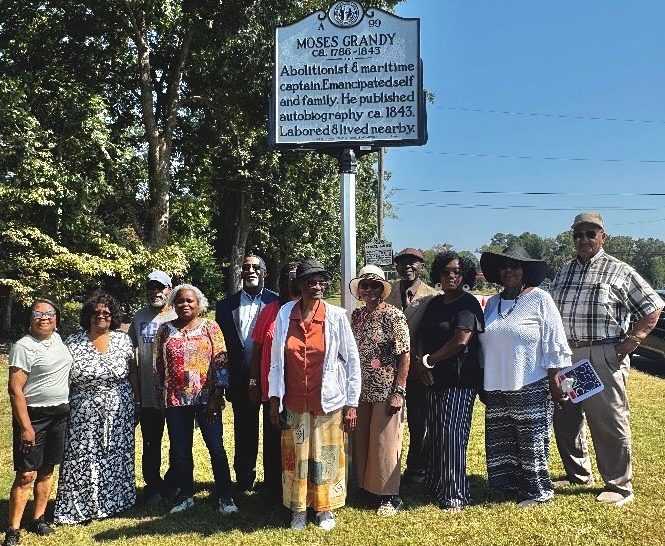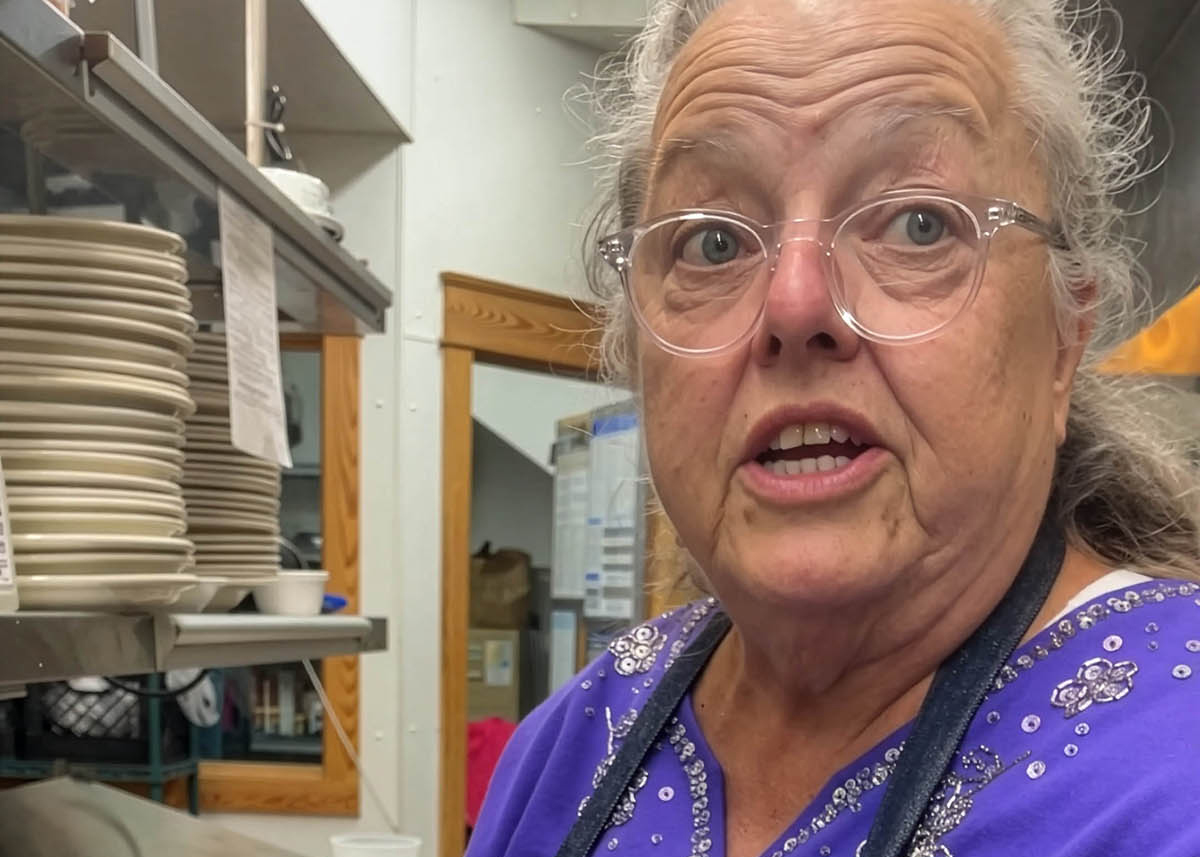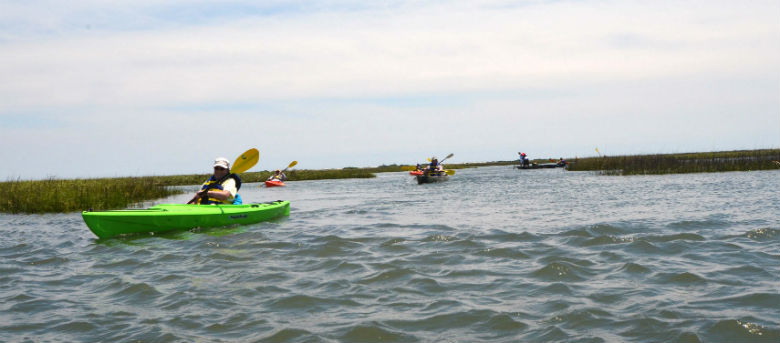
Kayakers wind their way through the marshes on their way to Masonboro Island. The kayak tours are appropriate for expert and novice paddlers. Photo by Tess Malijenovsky
Supporter Spotlight
WILMINGTON — This summer a new partnership between New Hanover County Parks and Gardens and canoe and kayak outfitter Hook, Line & Paddle brings local water lovers a series of kayak eco-tours. Paddlers will launch from various county parks and explore the ecology each has to offer.
Being next to the Atlantic Ocean and the biggest river basin in North Carolina, New Hanover County has copious kayak accesses.
“Let’s highlight them,” Chris Tryon, owner of Hook, Line & Paddle, said, “along with talking about the ecology and how to keep to our waterways clean.”
The county is interested in promoting kayaking in its parks as a recreational water activity that doesn’t pollute, that’s silent and, therefore, far less detrimental to the environment.
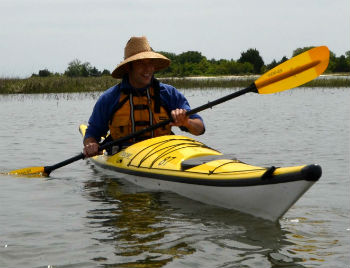 Matt Collogan leads the kayak tours. Photo by Tess Malijenovsky |
“We’re showing people that you can use our boat launches, not just for fishing boats or recreational motorized boating, but that you can also do kayaking,” said Matt Collogan, who works for New Hanover County Parks and Gardens as the environmental education program manager for Airlie Gardens.
Supporter Spotlight
It was beautiful spring day a couple of weeks ago for the first eco-tour of the series out of Trails End Park, in the southern part of the county off Masonboro Loop Road. A group of visitors and locals gathered by the multi-colored touring kayaks provided by Hook, Line & Paddle as Tryon talked about kayak paddling techniques and safety.
Novice kayakers shouldn’t be discouraged from these kayak eco-tours. Tryon was a certified kayak guide at Cape Fear Kayak before he took over the business in 2007. Also, the group moves at a leisurely pace.
Everyone was excited as they launched into their buoyant state at high tide. The kayaks move silently, almost gracefully, across the inlet, permitting the egrets to rest in the marsh and the ospreys to continue plunging like missiles into the water for a meal.
“You just can’t get closer to nature than being in a kayak I feel like,” said Collogan.
The eco-tour reached its final destination at the national estuarine research reserve of Masonboro Island, one of the few remaining undeveloped barrier islands along North Carolina’s coast.
Just off the shore a staked sign tells the group they have entered colonial waterbird nesting territory. Collogan seized the moment to talk about the waterbirds that nest directly on the sand. While swallows flitted about the group, they learned about how the speckled eggshells of various waterbirds camouflage on the seashell spotted beach. Foxes and ghost crabs are among the lists of predators.
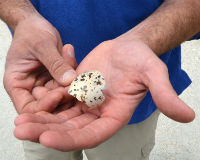 A speckled bird shell was one of the finds on Masonboro Island. Photo: Tess Malijenovsky |
Nestled between Wrightsville Beach and Carolina Beach, Masonboro’s 4,831 acres are considered an important bird-nesting area by the National Audubon Society, which means it’s internationally recognized as being vital to the conservation of birds and other biodiversity. The biodiversity was abundant on the tour with American oystercatchers standing by on the beach, pelicans surfing the waves and a porpoise revealing its dorsal from the ocean.
The eco-tour not only revealed the marvels of the environment, but also the pressures that threaten it and the conversation measures people can take to preserve it.
“It’s up to us to recycling our oyster shells, pick up our dog poop and recycle plastics,” said Collogan.
Tryon brings up the PVC pipes that the kayakers passed coming to the island, identifying them as oyster beds and encouraging everyone to recycle his or her oysters by putting them back in the water or bringing them to oyster recycling centers. New oysters grow on the hard surfaces of old oyster shells.
“Oysters are really the keystone species in the salt marsh creeks on the sound side because they’re the ones that filter all the water, and provide habitat and food for all kinds of things,” Collogan said. “We’ve lost 90 percent of the native oyster population in North Carolina since the year 1900, largely from over harvesting, habitat degradation, pollution and sedimentation.”
Moving around to the oceanside of Masonboro, the guides brought the group’s attention to the progression of plant complexity, from shrubs to live oaks. Branches of lives oaks can fuse together to share nutrients, according to Collogan. “Imagine along the whole length of a barrier island you have all the live oaks connected. That makes them that much stronger for a hurricane,” he said.
Learning about the local environment from an educator and paddling in the element with a pro, residents will likely heighten their appreciation for living by the coast. Best of all, each kayak eco-tour this summer explores a different county park and its endemic biodiversity.
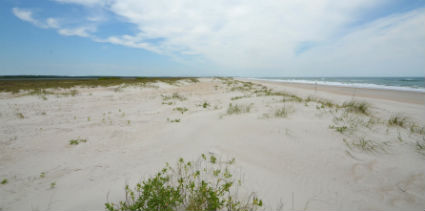 Wide, empty beaches await after a kayak trip to Masonboro Island. Photo: Tess Malijenovsky |
Coming up next July 1, from 3 p.m. to 5:30 p.m., the kayak eco-tour leaves Airlie Gardens heading up Bradley Creek, which is a dynamic brackish water environment. “You can see the spartina grass change into black needle rush and then eventually there are some cypresses at the very end,” said Collogan.
Following Bradley Creek, an eco-tour will launch from Riverside Park on July 26, from 10 a.m. to 12:30 p.m., along the Cape Fear River. Paddlers may have a chance to walk around Kegg Island, Campbell Island and Shark’s Tooth Island for a chance to find natural artifacts, such as fossils or shark teeth.
Keep a lookout for more kayak eco-tours to be scheduled later in the summer at the New Hanover County Parks kayak page. Registration is $25 with your own kayak and $50 for rental equipment. For more information and registration call 910-798-7707 or email Collogan.




